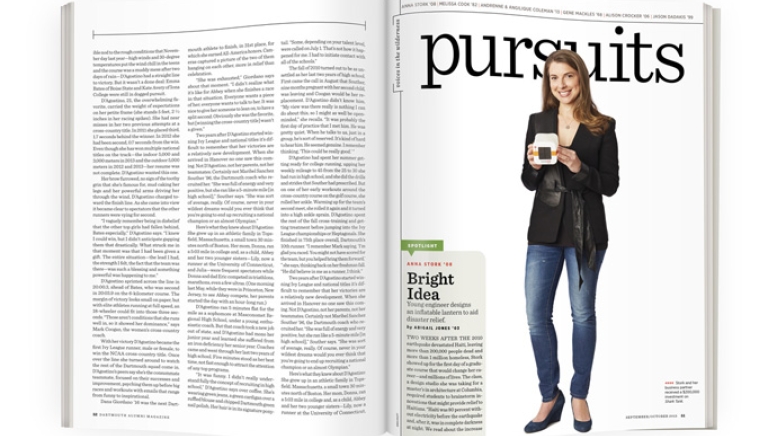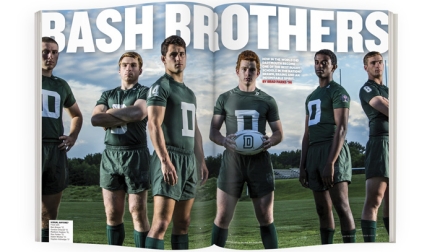Anna Stork ’08
Bright Idea
Young engineer designs an inflatable lantern to aid disaster relief.
Two weeks after the 2010 earthquake devastated Haiti, leaving more than 200,000 people dead and more than 1 million homeless, Stork showed up for the first day of a graduate course that would change her career—and millions of lives. The class, a design studio she was taking for a master’s in architecture at Columbia, required students to brainstorm innovations that might provide relief to Haitians. “Haiti was 80 percent without electricity before the earthquake and, after it, was in complete darkness at night. We read about the increase in kidnappings, rapes and theft because people were so desperate in tent cities,” says the Sherborn, Massachusetts, native. “We saw lots of food, shelter and medical supplies being sent down there, but there really wasn’t lighting.”
Stork and Columbia classmate Andrea Sreshta decided to design an inflatable, waterproof solar light that could be easily given out during disaster situations. “Solar makes so much sense because there’s so much sun in that area, so it can last a long time,” says Stork. “It’s also fairly inexpensive and can be distributed cost-effectively.” A few months later the pair filed for their first utility patent, and in 2011 they launched their company, LuminAID. Their Indiegogo crowd-funding campaign—which aimed to raise $10,000 to fund 1,000 lights—brought in five times that amount.
LuminAID’s solar light looks like an inflatable lantern, weighs just under 3 ounces and provides up to 16 hours of LED light. It’s waterproof and can recharge on the go. Once you’re done using it, the light folds up easily and packs flat.
The Chicago-based company supplied Doctors Without Borders and the international relief charity ShelterBox with more than 20,000 lights for the 2013 Typhoon Haiyan aid response. “That was a moment where we thought, ‘We’ve finally built a company that can supply these lights after an emergency and make a substantial impact on people who have lost everything.’ That was really meaningful to us,” Stork says. “There are moments every day when we get pictures back from people using the lights in different areas.” Most recently the company distributed more than 1,000 lights to Nepal relief efforts following the 7.8-magnitude earthquake that hit that country in April, destroying up to 70 percent of homes in rural areas.
The company has donated 10,000 lights in more than 50 countries through its Give Light, Get Light charitable program. Stork and Sreshta are also pursuing the outdoor recreation market, and their products can be found at L.L. Bean and Amazon.com, with a single light selling for $20. If Stork’s story is starting to sound familiar, that may be because she and Sreshta competed on ABC’s Emmy-winning reality TV show, Shark Tank, where they received offers from all five “sharks” before closing a $200,000 deal for 15-percent equity with billionaire Mark Cuban. Last year they were named Toyota Mothers of Invention and received a $50,000 grant at the Women In the World Summit in New York.
Stork’s venture won’t surprise people who knew her growing up. “I loved tinkering,” she says. “In high school I made a telescope by hand, including the lenses. I have always been interested in making things, I just never knew it would lead me to this.”
—Abigail Jones
Melissa Cook ’82
The Strategist
During a recent trip abroad Cook watched as two fellow diners split the check. One paid with a smartphone, the other transferred her share by text. Was Cook in Beijing, or maybe London? Try Nairobi, Kenya, a leader in mobile money. “Kenyans think we’re so archaic with our swiped credit cards,” she says.
That’s the kind of story Cook likes to share. As managing director of African Sunrise Partners—a boutique firm that provides research and advice on the country’s markets to U.S. investors—erasing misconceptions is often a challenge. “I always joke that my clients think Africa is one country, and that’s really not much of a joke,” she says. “People assume it’s all starving children and burned-out buildings.”
Cook fell in love with the continent as a tourist when she visited Kenya, Tanzania and Rwanda in 2007, charmed by the warmth of the people and their enterprising spirit. She left a job as head of global research at Lazard Asset Management to found her company in 2010. She has since returned to Africa more than 30 times, watching it swell with entrepreneurs—from soap being sold by women on East African roadsides to Nigeria’s publicly traded Dangote Cement, built by one of the country’s most successful businessmen. The White House has taken note. Last year Cook was appointed to the President’s Advisory Council on Doing Business in Africa, alongside heavy hitters from corporations such as Walmart.
A Boston native who lives in Patterson, New York, Cook trained as a competitive horseback rider while at Dartmouth. She switched gears after earning a history degree, finding a niche as an equity analyst. “I have a short attention span. I always like to be on the move,” she says. These days that means traveling to the next location on her ever-expanding hot list. “There are 54 countries in Africa,” she says. As she likes to tell CEOs, “Business is happening there, so either get on board now or you’re going to miss it.”
—Heather Salerno
Andrenne & Angilique Coleman ’13
The DJ Duo
During the day the twins can be found in their offices—Angilique as a marketing associate at the Apollo Theater Foundation, Andrenne as a sales planner at iHeartMedia. But at night they take to the stage as Angel + Dren, a stylish New York City-based DJ duo.
Not long after graduating from the College with matching degrees in Romance studies (both learned Spanish and Portuguese), the two were turned on to disc-jockeying by a friend who had the equipment. It took only a moment of experimenting for Angel to become obsessed. “I went home and I told Dren that we needed to learn how to DJ,” she says. “She didn’t ask me any questions, she just said, ‘Yeah, you’re right, let’s learn.’ I guess she trusted that I knew what I was onto.”
After a few months of practicing together daily, they booked their first gig. “Dren cold-called this place,” Angel says, “and they didn’t ask us for any music, they didn’t ask us for anything.” The pair went on to play a set that lasted six hours. Dren describes their sound—a mix of hip-hop, R&B and reggae infused with splashes of samba from their travels abroad—as “relaxing, fun, upbeat and uplifting.” During events the sisters work as a team. “I’m able to check out crowd responses and kind of feel out the energy of the room and go back and give Dren notes while she’s playing,” says Angel, “and she’ll do the same for me.” Now, more than a year since their DJing debut, Angel and Dren work regularly at venues across New York City as well as in Atlanta. This past winter they were invited to DJ a fashion magazine’s launch party during New York Fashion Week. “It was so exciting,” Dren gushes. “I had so much fun.”
Their full-time jobs may be their priorities now, but both are enthused about the opportunities presented by their music and recent forays into music production (listen to them at soundcloud.com/angelanddren). “We take it a day at a time,” Dren says. “We’re just trying to advance our skill set at this point and see where that takes us.”
—Marley Marius ’17
Gene Mackles ’68
Game On
A few years ago Mackles decided to create a strategic card game. He’d never invented a game before, but whenever he played one he always thought about how he would improve it. “I kept thinking, ‘This game would be better if…,’ ” he says. A former graphic designer for 23 years at WGBH in Boston, the Auburndale, Massachusetts, resident had the artistic chops to get the look of his game just right. So he did.
He named his card game Iota and self-published it when he was satisfied with the design. Mackles then submitted it to the 2012 Mensa Mind Games competition—and won. Winning attracted the attention of some major game publishers. Mackles ended up licensing Iota to Gamewright, and more than 100,000 little metal tins of the grid-based game have been sold since.
Mackles works as a freelance graphic designer and painter when he’s not developing new games through his company, PDG Games. He’s currently selling four card games he created. “There’s something about games that just kind of intrigues me,” he says. “I see them as little perpetual-motion machines—there’s a system that has its own engine, one thing is connected to another, it all kind of works almost like a mechanical thing.”
He’s working on a new project, a game of global domination called World, that he takes to meetings of the Game Makers Guild, a local community of more than 500 game developers and players. He and the other members play-test their games-in-progress and offer each other feedback on how to make them better. Mackles hopes to debut World this fall at the Boston Festival of Indie Games.
—Carolyn Kylstra ’08
Gene’s top 5 favorite games
Poker. “A perfect blend of luck, skill and interaction”
Chess.“The game is simple. The strategy is complex.”
Pictionary. “It’s all about communication, not drawing.”
20 Questions. “Basic and fun. No equipment needed.”
Hearts. “Light and deep—a rare combination”
Alison Crocker ’06
Wild Navigation
Decamping for Oxford in 2006, this Rhodes scholar, a math and physics double major, had every intention of leaving athletics behind. A longtime competitive cross-country skier, Crocker wanted to focus on her graduate work in astrophysics—she’s now an assistant physics professor at Reed College—thinking that she would run merely to stay in shape. It was only a few months before the competition bug bit her again. Through a friend Crocker rediscovered orienteering, a sport she had tried in boarding school. Developed in Sweden as a form of military training, orienteering is a timed footrace through the woods, where competitors armed with maps and compasses must hit specified checkpoints.
“You’re not going on trails,” Crocker says, “you’re jumping over logs, you’re dodging trees, you’re avoiding lakes because you can see them on the map.” In many ways it works much like her research in the lab, studying star formations in nearby galaxies. Orienteering, like astrophysics, requires “thinking about 2D representations of 3D space,” she says.
Although the demands of academia limit her most rigorous training to weekends, Crocker has represented the United States in five world championship events and won multiple U.S. Orienteering Championship medals in both foot- and ski-orienteering. She is looking forward to returning to Hanover in September 2016 when the College hosts the North American Orienteering Championships. “I thought my athlete days would end after college,” she laughs. “I can’t believe I’m still doing this.”
—Marley Marius ’17
Jason Dadakis ’99
Water Guardian
For millions of California residents Dadakis is the one who keeps clean water flowing—a challenging task as the state faces one of the most severe droughts in its history.
Dadakis is director of health and regulatory affairs and interim research director for Orange County Water District (OCWD), which oversees, manages and protects the region’s groundwater basin, serving more than 2.4 million residents. OCWD also owns and operates the world’s largest recycled water project for potable use, known as the Groundwater Replenishment System (GWRS) project. It can produce up to 100 million gallons of water per day, meeting the water demands of approximately 850,000 people in north and central Orange County.
The nitty-gritty of how the GWRS works is not exactly appetizing, at least not at first: Treated sewage or wastewater that would otherwise be sent to the ocean for disposal is purified through a three-step process centered on reverse osmosis. The water is then put back into the aquifer system to replenish the groundwater basin and prevent seawater intrusion. “From a psychological standpoint, the public is more comfortable with an environmental buffer between treatment and use,” says Dadakis. “We can demonstrate that the water quality coming out of the facility is very pure, as good or better than traditional drinking water supplies, but people tend to have more comfort with it when it’s introduced back into the environment—it breaks its history a little more.”
Dadakis, who studied earth sciences at Dartmouth and has a master’s in hydrology and water resources from the University of Arizona, says individuals can make a difference by considering their water footprint: “Think long and hard about whether you mow every week and just look at it, and now—as your rates go up—are you spending a lot of money watering it to keep it green?”
—Abigail Jones ’03




